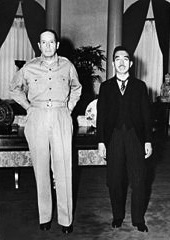Japan: The World’s Really Lucky Country
Compared with other occupied nations, how did postwar Japan get so lucky?
June 16, 2013

I recently attended a meeting organized by the World Economic Forum (WEF) on Israel and Palestine, entitled “Breaking the Impasse,” in Ramallah, Palestine.
The last time I was in a country under occupation was Japan after World War II.
This recollection and looking at the state of the Israeli occupation of the Palestinians reminded me of how unbelievably lucky the Japanese have been, arguably the world’s luckiest people.
Since there is a good deal of revisionism in the air with the current Abe administration in Japan, it seems important to set things in their proper context.
First, the Japanese were lucky with respect to their occupier.
In spite of the fact that Japan was an ally of Nazi Germany and the USSR was an ally of the United States and the UK in World War II, the USSR and Japan had signed a neutrality pact at the beginning of the war.
This allowed Stalin to focus energy on fighting Hitler, while the Japanese could concentrate on the conquest of China and Southeast Asia — the so-called Greater East Asia Co-Prosperity Sphere.
A different defeat
Following the defeat of Germany, the USSR declared war on Japan: Further Soviet moves, however, were pre-empted by the sudden declaration by Japan of unconditional surrender to the United States.
Japan thus escaped the fate that befell Germany and Korea of being divided in two.
Even so, the Japanese to this day contest the Russian occupation of what they refer to as their “Northern Territories” (the Kuril Islands for Russia).
But that is peanuts compared to what could have been the Soviet occupation of Hokkaido and possibly the northern part of Honshu. Lucky Japan!
Second, witnessing the Israeli occupation of Palestine and remembering the American occupation of Japan, one is struck by how much comparatively the latter was a bed of roses.
When Japan surrendered and the United States occupied, the Americans were bent on punishing and weakening Japan. The goals were encapsulated in the so-called three “de’s”: demilitarize, de-industrialize and democratize.
Cold War calculus
By the time I arrived in occupied Japan in 1950, however, the policy had radically changed from retribution to rehabilitation. Japan was extremely lucky that Mao “liberated” China in 1949 and the Korean War broke out in 1950.
These two events and the onset of the Cold War almost instantly transformed Japan from defeated enemy to pampered protégé.
Senior wartime officials who had been imprisoned were liberated (including Prime Minister Abe’s grand-father, Nobusuke Kishi). And the United States used multiple means to facilitate and promote the country’s “re-industrialization.”
The Japanese thus benefited from the Korean War in two ways: First, through American soldiers sojourning on R&R (rest and recuperation), and second, via industrial revitalization and skill development (such as through repairs of U.S. ships and planes).
Technology was transferred on a massive scale.
Some U.S. companies had had partnerships with Japanese conglomerates before the war — notably General Electric with the Mitsui group and Westinghouse with the Mitsubishi group.
These U.S. firms were instructed by none other than the Supreme Commander of the Allied Pacific (SCAP) General MacArthur to renew their business ties.
Made in Japan
Before the war Japanese production had had severe quality problems. The “made in Japan” label was synonymous with junk.
The Americans’ biggest gift was to bring the great guru of statistical quality control (SQC), Edwards Deming, to Japan. There he found avid learners.
The dollar-yen exchange rate under the fixed Bretton Woods regime was set at ¥360. This gave Japanese exporters a huge competitiveness boost, allowing the export-driven Japanese economic miracle to occur.
Most societies have had to fight hard for democracy. The Japanese received it on a silver platter from Uncle Sam. This included a constitution, promulgated in 1947, which is a model of its kind and laid the basis for developing solid political institutions.
Japan’s is the first constitution, I believe, that explicitly recognizes the equality of men and women.
Of course, that is the constitution — what happens in society may be another matter.
Freedom from fear
The constitution includes the famous Article 9, in which the Japanese “forever renounce war as a sovereign right of the nation and the threat or use of force as means of settling international disputes.”
This is the main article that the country’s prime minister, Shinzo Abe, and his co-revisionists want to revise, even though this clause has served lucky Japan remarkably well. It allowed the country to focus all its energies on economic development.
Furthermore, the security treaty signed with the United States at the end of the occupation, still in force, provided the Japanese with enviable military protection.
Furthermore, the occupation in Japan, unlike that of Palestine, was not characterized by constant harassment and humiliation of the Japanese people.
There were no checkpoints through which Japanese citizens had to pass while going from A to B. Families were not separated. Indeed, there was quite a lot of fraternizing between the Occupied and the Occupiers.
Lingering concerns
The U.S. occupation of Japan laid the foundations for the country’s economic prosperity and political stability. However, there are two residual issues that are matters of grave concern.
First, General MacArthur, for the sake of avoiding political turbulence, opted not to prosecute, let alone execute, Emperor Hirohito.
Since the war had been fought in the Emperor’s name and, by all credible accounts, with his active involvement, the fact that he was exonerated and relieved of guilt meant that so was all of Japan.
In striking contrast to the Germans post-World War Two, the Japanese have no collective sense of guilt. This causes acute problems in relations with its neighbors, especially Korea and China, and is a profound source of acute tension.
Second, and partly arising from the first, Japan, again unlike Germany, has not renounced irredentist territorial claims. Japan harbors territorial disputes with its three major neighbors: the Russians, the Chinese and the Koreans.
Potential for conflict
These contemporary and historical narratives should also serve to remind us how much the Asian continent is potentially explosive.
All of this makes for a tension-laden continental expanse. At its western end, there is the Israel-Palestine powder keg and at the eastern end, the territorial conflicts between Japan and its neighbors.
In between, there are critical geopolitical fault lines, not the least of which is that between Pakistan and India.
Were the Japanese to recognize how lucky they were, their luck might endure.
The failure to do so, indeed the spirit of nationalism and revisionism currently prevailing in the Japanese government, may cause luck to turn to disaster.
Takeaways
Looking at the Israeli occupation of the Palestinians reminded me of how lucky the Japanese have been.
Because of unconditional surrender to the US, Japan escaped being divided in two like Germany and Korea.
Japan was lucky that Mao "liberated" China in 1949 and the Korean War broke out in 1950.
In contrast to the Germans after WWII, the Japanese have no collective sense of guilt.
Lack of collective guilt harms relations with Japan's neighbors, especially Korea and China.
Japan, unlike Germany, never renounced territorial claims.

